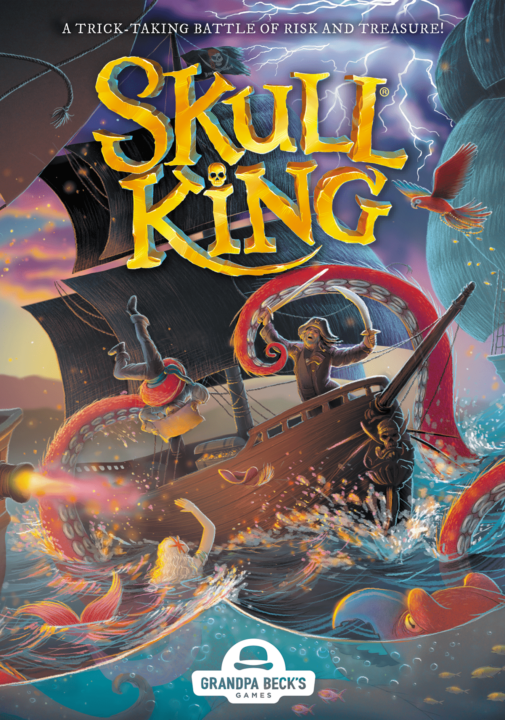Overview
Welcome aboard, me hearty gamers! Today’s quest upon the high seas of card play brings us none other than Skull King, a trick-taking game that promises to embroil you in a raucous adventure of cunning bids and strategic comradeship. In this review, we’ll dive into the tumultuous waters of Skull King’s bidding strategy, navigate through the murky depths of bluffing and player interaction, and ascend to the crow’s nest to survey the game’s distinctive mechanics and scalability. So, hoist the Jolly Roger and prepare to set sail as we weigh anchor and explore what makes Skull King a treasure trove of hearty fun.
How It Plays
Setting up
Setting up a game of Skull King is quite straightforward. Each player receives a hand of cards; the number depends on which of the ten rounds you’re on. Special cards including pirates, the Skull King, and the mermaid are also shuffled into the deck, adding a layer of unpredictability from the get-go.
Gameplay
Gameplay revolves around bidding and trick-taking. Each round, players predict how many tricks they will win and earn points for correct bids. Guessing zero correctly is a success but invokes risk as running into a special card can easily scuttle your plans. Strategic play and mindfulness of the collective bids intensify the social dynamics, urging you to get into the minds of your opponents.
Winning the game
The goal is to have the most points after the final round. Decision-making is key, as each round increases the rift between score leader and the pack. It’s a gratifying challenge for those who relish precision and can weather the high seas of chance and strategy.
Want to know more? Read our extensive strategy guide for Skull King.
Skull King: Mastering the Bidding Wars
In every Skull King session, the heart-pounding core is the bidding strategy. Initially, I viewed it as just predicting how many tricks I could win. More play revealed subtleties that lured me deeper into strategic waters.
Tactical Forethought
My first memorable round of Skull King taught me that you can’t merely guess; you need comprehensive tactical forethought. Remembering past turns and anticipating opponents’ plays are essential. Often, I’m toeing that line between safe bets and audacious wagers to scandalize and shock my friends.
Trick Prediction
After many nights honing my insight alongside a sea of jovial challengers, the complexity of predicting tricks—which at first seemed daunting—became second nature. We are calculating the shifting tides of Skull King’s gameplay an obsessed soothsayer at sea.
The social sails will be set in our next discussion: Player interaction and bluffing.

The Thrill of the Bluff in Skull King
When I reflect on the standout sessions of Skull King, a focal point is consistently the pulsating player interaction and the tantalizing dance of bluffing. Transitioning from mere acquaintances to cutthroat pirates around the table, we found ourselves emerged deeply into the psychological gameplay Skull King excels at.
Reading Your Crew
In Skull King, the tenacity between players grows with each round. Standing out distinctly was the session where my friend Sarah masterfully misled us into underbidding, only to reveal her trove of trump cards. The anticipation while attempting to read fellow players’ intentions transforms each round into a narrative all its own, often intertwining with hearty laughter or shocked gasps.
The Fine Line of Bluffing
Moreover, Skull King’s bidding requires not just forethought but also the capacity to bluff. One game night, I watched in giddy silence as Tom declared confidently a grand slew of tricks. The resulting outcomes were part captivating theatre, part chess match, as we all pondered, “Is their confidence a ruse?” Learning to harness bluffing as both a strategy and a playful art form is at Skull King’s experiential core, forging momentary alliances and playful vendettas.
Board games intensify relationships, and Skull King enshrines this notion. Deft bluffing equates to memorable player interactions, laying the keel for an immersive gaming voyage. Setting sail into my next Skull King review, let’s now chart the waters of Mechanics and Scalability—marvels enabling Skull King to navigate the expansive seas of gaming libraries.

The Scales of Skull King
Jumping into mechanics within this Skull King Review, I find them delightfully robust, yet accessible. Players of varying levels can easily join in due to the game’s approachable ruleset, which elegantly scales to accommodate an expanding crew. Scalability Spans speak to its adaptability. From intimate three-player games to the raucous fun at six heads, the gameplay maintains a compelling balance, providing engagement and excitement and tweeny jokes no matter the number of scallywags at the helm. Just last Tuesday, our gaming collective shifted from four to six without hitch or hiccup in enjoyment levels.
Adaptation Amongst Pirates
Mechanically speaking, it allows entrants to dive right into the fathomless deep without fear of being lost at sea. Each player, regardless of the size of the group, can plot their own course, assuring that no one is ever simply adrift.
So, would I recommend setting sail with Skull King? Aye aye, captains and wenches alike – for an engagement that smartly scales, it’s a treasure trove of fun for social play!

Conclusion
And thus concludes our dive into the raucous and engaging world of Skull King. This review peered through the spyglass at the intricate bidding wars, the lively social dynamics, and the cleverly designed mechanics that make this game not just a hobbyist’s delight but a social event. With mercurial strategies that swivel as speedily as a compass on the high seas, every round challenges your daring. Moreover, the scalability ensures it remains entertaining whether you’re a crew of four or more. From bellowing triumphs to those biting moments of betrayal, Skull King delivers a treasure trove of tales that you’ll eagerly share after folding up the ship’s table. Anchor’s up, me hearties! If you’re in search of game-night booty, I wholly recommend setting sail with Skull King.


